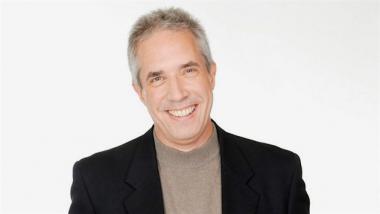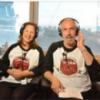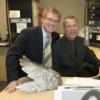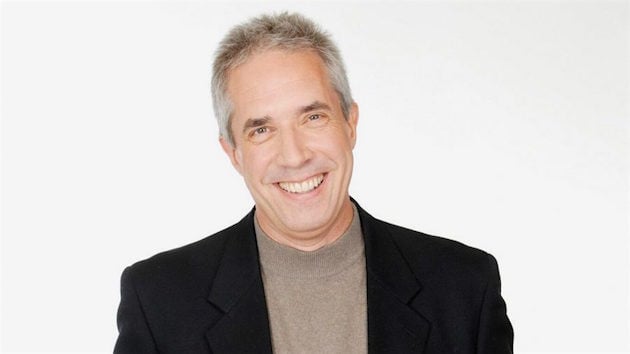
It’s totally in keeping with his on- and off-the-air character that Hoyt Smith isn’t making a big deal about his departure on September 29th from KDFC-FM (90.3 in San Francisco), the Bay Area’s sole classical radio station. His natural modesty might not clue you that he’s been at the station for 18 years, that his career dates back to his adolescence, that he was voted “Favorite Bay Area Radio Host” four years in a row by readers of San Francisco Magazine, and that he was named to the Bay Area Radio Hall of Fame last year. Smith is the voice of morning drive-time classical radio, starting listeners’ days with some chat and chuckle alongside their diet of Bach, Beethoven, and Bartók. Smith’s start in radio preceded his finishing high school in Marin County, and continued with a variety of stations and musical formats up and down the West Coast. He spoke with SFCV while on his commute from the KDFC studios to his San Francisco home, east of Twin Peaks.
Where are the studios now?
They’re in a lovely solid cement building, kitty-corner from Moscone Center.
And what about the transmitter? Where I live, west of Twin Peaks, I can’t hear you as well as I used to.
The Bay Area is a topographical mess! It was a little disheartening, needless to say, to be kicked off this powerful transmitter and out of a home this station had had for six decades [until the commercial Entercom Communications Corporation sold the station to the noncommercial University of Southern California in 2011]. We were suddenly kind of cast adrift, and it’s been, put one foot in front of the other and keep on marching. We could not do it without the Bay Area audience, and God love everybody who said, “we’ll listen any way we can.”
What was it like to go noncommercial, where you’ll have to support another fund drive during your last days on the air?
It was a double-edged sword. It’s nice to be done with chopping up an hour so you can take breaks twice an hour to take care of those commercial responsibilities.
You yourself had been a KDFC listener for a long time.
It was my first station when I came back to the Bay Area from San Diego in my mid-20s, because the transmitter was right there in Sausalito.
We should wind the tape back further to before you left, when you were growing up in Marin County.
My mom loved Scheherazade, she was really into the Romantics. But I grew up with a diet of Top 40 “personality” radio. I was a big fan of the old KSFO, which called itself ”The World’s Greatest Radio Station,” and I attribute whatever style I may have to hearing those personalities and their stories and senses of humor.
Weren’t you deputized to one of that station’s DJs, Don Sherwood?
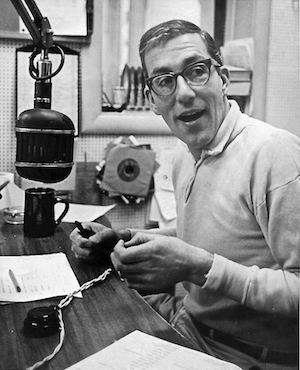
Yes. My dad and his brothers had a business — The Smith Company — that did mass marketing for KSFO, so there was a connection there.
What did you most admire about Sherwood?
Well, he was outrageous! He could deliver a line innocently enough, but he also had a filthy laugh. And it would sometimes, in a not so subtle way, push you into the realm of darkness or naughtiness.
Didn’t Sherwood’s station mate, Carter B. Smith, advise you not to go into the business?
Absolutely! Smith was a very likeable, down-to-earth, intelligent man who used the English language very well. And they all loved what they did and felt blessed to be there, but Smith really knew the pitfalls. It’s an incredibly competitive job that one can be relieved of at a moment’s notice for virtually no reason whatsoever, even if you’re a union employee. I found that out when I later worked for NBC.
Were you a big classical fan as a kid?
The first concert I went to was with the virtually new Marin Symphony, which was born the year I was born (1952). I was a fidgeter, so it was pretty tough for me to sit still for more than a few minutes.
Later, you got more classical exposure, at the College of Marin.
I took a music appreciation course, around 1969 or ’70, and some film courses. It was all about the pieces that really moved you. I heard a lot more Bach and Vivaldi there, but I think what really grabbed me was film music. And that’s why I like Puccini operas, because I think he was enough into the 20th century that he had a cinematic quality.
I heard Ravel and Debussy at the College too, and those were just as mystical and magical to me. I started listening more to KDFC, but it was really kind of a Baroque jukebox back then. Whenever I heard something a little more modern, I’d go to Tower Records and try to dig it up. When I moved to San Diego, I applied to a classical station.
Your bio says you learned “classical announcing” at KPBS down there.
That was my first on-air job, and my first foray into classical announcing, but we were thrown on the air without much guidance. We played light classical, and I learned to say L’Arlésienne. Later, when I started this job, I found a pronunciation guide and started studying it. After six months, it started to click
But is there something to classical announcing other than pronunciation and history? I gather you didn’t like the bravado of rock deejays.
I tried it, and I just thought, this isn’t who I am. I have old tapes from my first commercial station in Carlsbad, California, ”Carl FM.” It was rock.
Some while later you got into announcing smooth jazz.
I always liked that kind of artist, and when Brown Broadcasting took over an adult contemporary station, KLOK-FM, I made the cut, and had an opportunity to develop a stage presence and get up there and introduce smooth jazz acts at our parties. I love that format to this day, but there isn’t much of it on radio any more. With all the corporatization, there just isn’t a place for it.
What do we have instead?
Twenty different brands of rock ’n’ roll, and sports, and news talk, and hate talk. And, if we’re lucky, classical and jazz, and that’s it. I was a big fan of KJAZ for years, and KCSM [jazz radio] in more recent years.
What do you suppose appealed to Bill Leuth [KDFC’s president] when he hired you, in 1999?
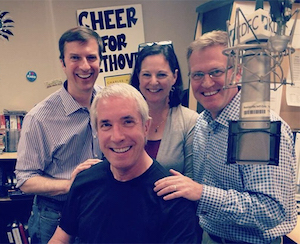
I think it was just kind of a natural style, looser than your standard classical announcer. And as I was saying to [San Francisco Chronicle classical-music critic] Josh Kosman the other day, if there’s one attribute that helped me grow on this job, it was something I didn’t think I had, and that was an innate curiosity about all sorts of things. What was going on when Vivaldi was living in Venice? Why was Haydn hiding in his apartment when he was composing his late works?
KDFC started you on afternoons, and then moved you to mornings.
I was excited about that, and honored. But as I’ve stated to anyone who’ll listen, I’m not a morning person, I’m more of a night owl. It’s not so much of a struggle any more to wake up around 4 in the morning; once I get out of bed and am showering, it’s, “What am I going to talk about today, what does Bill have planned for us, what does the world have planned for us, what have I seen that was funny?” It helps power my day, and what’s nice is, I get off at 1 or 2 and have a whole afternoon free. Of course, you don’t have much of a nightlife, because you’re in bed by 9 every night.
How does KDFC hold up compared to classical stations elsewhere?
I think we all work really hard trying to present a very listenable, compelling, entertaining product. It’s giving the public what they want, but at times giving them what they don’t know they want but, when they hear it, will go, “Oh, I like that!” Every time I see Alan Chapman, who’s on Saturday night with Modern Times, at 10 p.m., I compliment him, because he brings this knowledge base of music that will stretch your mind, but won’t blow your mind.
Next month, when Ray White takes over your show, what are you going to miss the most?
(Don’t cry, Hoyt!) [chuckles] I’ll definitely be missing the people I work with every day, I mean, we really are a family. I’ve made some wonderful friends here. I was in awe of Diane Nicolini, even before I met her, and I knew Rik before. Ray is my age, and we have so much in common.
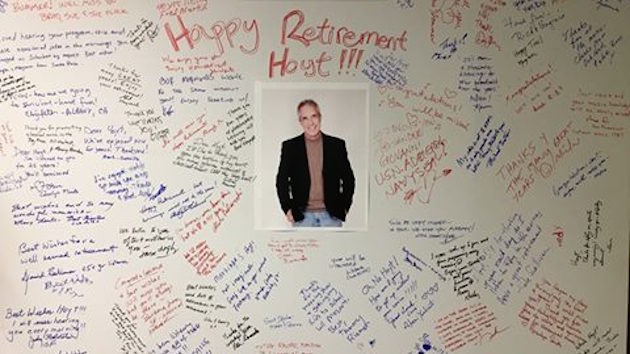
And what will you be doing with your free time?
My wife Jackie and I have been talking about this. She retired from United Airlines a couple of years back, and when we talked about travel — her former occupation makes it a lot easier and more reasonable — she said, “I think we should follow the music.” There are some great festivals around the world that we would love to see. I’ve always wanted to go to the jazz festival in Montreux, and while we’re in Switzerland, to the Verbier [classical] festival. Alasdair Neale’s festival in Sun Valley is just a car drive away, and there’s the Santa Fe Opera.
Are you in good health for all that? You had a scare a while ago.
I was born with a congenital heart defect, and in my 50s I developed atrial fibrillation. I went to an amazing surgeon, Doctor Gaudiai (“Doctor God”), and he took care of the problem, and I’ve been in very fine shape for the last 10 years.
What else is on your bucket list?
Kent Nagano and I were both born on the same day in the same year, he in Berkeley and I in Marin. That’s St. Cecilia’s Day [November 22], the patron saint of music. I played piano as a kid, but never really applied myself to it, so I would like to learn an instrument again.
And will you keep listening to KDFC?
Absolutely. There are too many communities that have lost access to a classical radio station, but you can listen to KDFC anywhere in the world. There was a guy who drove trucks and would call in and tell me, “You’re getting me through the day, thank you for being there.” I’ve had friends listening to me in the Mekong Delta, in a cruise boat. People have told me, “You’re our evening guy, here in Russia.” Bill and the gang are trying to keep up with these changing trends in listening, all the while trying to keep things humming on transmitters around the Bay Area, for all the rest of us. I have no fear that classical radio will disappear.

